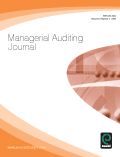
Managerial Auditing Journal
Scope & Guideline
Driving Knowledge Forward in Managerial Auditing Discourses.
Introduction
Aims and Scopes
- Audit Quality and Evaluation:
The journal emphasizes the evaluation of audit quality through various lenses including auditor characteristics, methodologies, and external factors that influence audit outcomes. - Corporate Governance and Internal Controls:
Research often explores the role of governance structures and internal controls in shaping audit practices and ensuring transparency and accountability within organizations. - Impact of Technology on Auditing:
There is a consistent focus on how emerging technologies, such as artificial intelligence and data analytics, are transforming auditing practices and improving audit efficiency and effectiveness. - Behavioral Aspects of Auditing:
The journal includes studies that examine the psychological and behavioral factors affecting auditors' judgments, decision-making processes, and professional skepticism. - International Financial Reporting Standards (IFRS):
Research in this area explores the implications of IFRS on audit practices, including the challenges and ambiguities that arise in the application of these standards. - Sustainability and Ethical Considerations:
The journal also addresses the growing importance of sustainability reporting and ethical considerations in auditing, reflecting a broader trend in corporate social responsibility.
Trending and Emerging
- Impact of COVID-19 on Auditing Practices:
The COVID-19 pandemic has prompted a surge in research examining its effects on audit fees, delays, and the adoption of remote auditing practices, highlighting the resilience and adaptability of the auditing profession. - Digital Transformation and Data Analytics:
There is an increasing emphasis on the role of digital technologies and data analytics in enhancing audit quality, with research exploring how these tools can improve decision-making and efficiency. - Behavioral Insights in Auditing:
The exploration of behavioral factors influencing auditors' judgments and decisions is gaining traction, reflecting a broader interest in understanding the human elements of auditing. - Sustainability and Corporate Social Responsibility:
Research on sustainability reporting and the ethical implications of auditing practices is on the rise, in line with global trends towards greater corporate accountability and transparency. - Artificial Intelligence in Auditing:
The integration of artificial intelligence and machine learning into auditing processes is emerging as a critical area of study, with implications for audit quality and operational efficiency.
Declining or Waning
- Traditional Risk Assessment Models:
There is a noticeable decline in research focused solely on traditional risk assessment models, as new methodologies and technologies gain traction in evaluating audit risks. - Focus on Sole Proprietorships and Small Firms:
Research concentrating on the auditing practices of sole proprietorships and small firms has decreased, possibly due to a shift towards larger entities and more complex organizations. - Static Compliance-Based Auditing:
The focus on compliance-based auditing practices has waned, as there is a growing recognition of the need for adaptive and risk-based approaches. - Regional Studies with Limited Generalizability:
There has been a reduction in studies that focus on very specific regional contexts without broader implications, as researchers seek to produce findings that are more universally applicable. - Auditor Independence in Established Markets:
Research examining auditor independence in well-established markets appears to be less frequent, as the conversation shifts towards independence in emerging markets and the effects of globalization.
Similar Journals

Southern African Journal of Accountability and Auditing Research-SAJAAR
Exploring the Dynamics of Accountability in Southern AfricaThe Southern African Journal of Accountability and Auditing Research (SAJAAR) serves as a pivotal platform in the field of auditing and accountability research, published by the South African Institute of Government Auditors. This journal is dedicated to advancing the understanding of accountability frameworks, public sector governance, and auditing practices within the Southern African context. With a rich heritage in promoting high standards of academic rigor, SAJAAR aims to foster significant discussions among researchers, professionals, and students alike. Though it operates under a traditional subscription model, the journal remains accessible for those committed to enhancing their knowledge and practice in this critical area of study. The journal is instrumental in bridging the gap between theory and practice, making it a valuable resource for anyone seeking to contribute to the discourse on governance and accountability, particularly in developing regions.
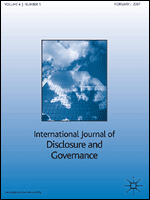
International Journal of Disclosure and Governance
Fostering insights for a transparent economic landscape.The International Journal of Disclosure and Governance, published by Palgrave Macmillan Ltd, is a pivotal platform in the fields of Accounting, Business, Economics, Finance, and Management. With an ISSN of 1741-3591 and an E-ISSN of 1746-6539, this esteemed journal serves as a valuable resource for researchers, professionals, and students alike, looking to explore the intricacies of governance and transparency in financial practices and corporate strategies. As evidenced by its performance, the journal has achieved a commendable Q2 ranking across multiple categories in 2023, signifying its influential role within academic discourse, particularly in Economics and International Management. With a history that spans from 2009 to 2024, the journal provides insights that are essential for advancing knowledge and practice in a rapidly evolving global environment. While it operates under a subscription model, the work published here remains impactful, ensuring readers have access to high-quality research that can drive both theory and application forward.
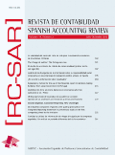
Revista de Contabilidad-Spanish Accounting Review
Fostering Innovation in Financial Insights.Revista de Contabilidad-Spanish Accounting Review, published by the Universidad de Murcia, is a prestigious open-access journal dedicated to advancing the field of accounting and finance. Since its inception in 1997, the journal has aimed to foster high-quality research and disseminate innovative findings that contribute significantly to the international accounting community. With an ISSN of 1138-4891 and an E-ISSN of 1988-4672, this journal proudly embodies a commitment to accessibility, allowing researchers, practitioners, and students to engage with a wealth of knowledge without financial barriers. As of 2023, it holds a respectable position in the Scopus rankings, being placed in the Q3 category within Accounting, with a ranking of #98/176 and a percentile standing at 44th. The Revista covers a wide array of topics including financial reporting, auditing, and managerial accounting, and is a pivotal platform for groundbreaking studies that shape the discipline. Located in the vibrant academic setting of Murcia, Spain, this journal is essential reading for those looking to stay abreast of contemporary developments in accounting research.
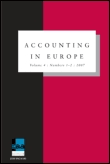
Accounting in Europe
Exploring the forefront of accounting scholarship in Europe.Accounting in Europe is a distinguished peer-reviewed journal published by Routledge Journals, Taylor & Francis Ltd, focusing on the critical intersections of accounting practice in the European context. With an ISSN of 1744-9480 and an E-ISSN of 1744-9499, this journal is essential for researchers and professionals navigating the complexities of accounting and finance in a rapidly evolving global landscape. It has been recognized for its scholarly contributions, achieving Q2 rankings in 2023 across multiple categories including Accounting, Business and International Management, and Finance. The journal's impressive Scopus rankings—43rd in Accounting and 78th in Finance—underscore its influence and relevance, placing it in the top quartile of academic discourse. Published in the UK and accessible through traditional and digital formats, Accounting in Europe serves as a vital resource for innovative research, policy discussions, and theoretical advancements, catering to an audience dedicated to enhancing the field's knowledge and impact.
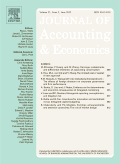
JOURNAL OF ACCOUNTING & ECONOMICS
Unveiling Groundbreaking Theories in Accounting and Finance.JOURNAL OF ACCOUNTING & ECONOMICS, published by Elsevier, is a leading peer-reviewed journal in the fields of accounting, economics, and finance, providing a vibrant platform for the dissemination of groundbreaking research since its inception in 1979. With an impressive impact captured in its Q1 rankings across its categories—Accounting, Economics and Econometrics, and Finance—the journal ranks #11 in Accounting, #30 in Finance, and #73 in Economics according to Scopus. It serves as an essential resource for researchers, professionals, and students alike, fostering a deeper understanding of economic principles and accounting practices while promoting innovative methodologies and theories. Although it does not offer direct open access, the journal is committed to academic excellence and rigorous peer-review standards, ensuring that published works contribute significantly to the body of knowledge in its respective fields. With its address in Amsterdam, Netherlands, the journal invites contributions from scholars worldwide, emphasizing its international reach and impact.
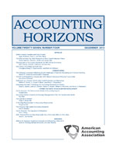
Accounting Horizons
Exploring New Frontiers in Accounting KnowledgeAccounting Horizons is a premier journal published by the American Accounting Association, dedicated to advancing the accounting discipline. With an ISSN of 0888-7993 and an E-ISSN of 1558-7975, this esteemed publication has established itself as a key resource in the field, evidenced by its ranking in the Q1 category within the Accounting domain for 2023. Its significant Scopus rank of #72 out of 176 in the Business, Management, and Accounting category, placing it in the 59th percentile, further underscores its impact and relevance to contemporary scholarship. Since its inception in 1996, Accounting Horizons has provided a platform for high-quality research that addresses the complexities of accounting practices, theories, and technologies, making it an invaluable tool for researchers, academics, and industry professionals alike. Although it currently does not offer open access options, the journal remains committed to fostering insightful dialogue and research dissemination within the accounting community.
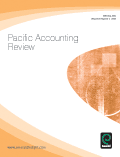
Pacific Accounting Review
Pioneering Insights for Financial ProfessionalsPacific Accounting Review is a prominent academic journal that serves as a vital platform for innovative research and critical insights in the fields of accounting and finance. Published by Emerald Group Publishing Ltd in the United Kingdom, this journal has established itself as a reputable source of knowledge since its inception in 1997. With robust indexing in Scopus, it currently ranks in the Q3 category for Accounting and Q2 for Finance, reflecting its significant contribution to these fields. The journal's focus encompasses a diverse range of topics, making it essential reading for researchers, professionals, and students eager to explore the latest trends, methodologies, and findings in accounting and finance. Although it is not open access, the journal maintains a commitment to academic excellence and encourages submissions that push the boundaries of theory and practice. The Pacific Accounting Review plays a critical role in shaping the future discourse of its subject areas and fostering academic collaboration globally.
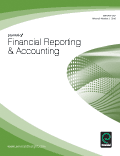
Journal of Financial Reporting and Accounting
Unveiling the Future of Accounting and Reporting Standards.Journal of Financial Reporting and Accounting is a distinguished publication within the field of accounting and financial reporting, expertly disseminated by Emerald Group Publishing Ltd. With an ISSN of 1985-2517 and an E-ISSN of 2042-5856, this journal is positioned as a vital resource that contributes significantly to the academic discourse in its domain. As of 2023, it holds a reputable Q2 category ranking in several crucial areas, including Accounting, Economics, Econometrics and Finance, and Management Information Systems, indicating its impactful scholarly contributions. The Scopus ranking further attests to its prestige, ranking it within the top tiers of global journals, thereby affirming its appeal to researchers, professionals, and students alike. The journal has successfully published articles since its inception in 2003, maintaining a commitment to high-quality research and innovation in financial reporting. Although currently not available as an Open Access journal, the Journal of Financial Reporting and Accounting remains essential for those seeking to advance their knowledge and practice in financial analytics, reporting standards, and accounting methodologies.

International Journal of Accounting
Exploring Innovative Solutions for Financial Challenges.The International Journal of Accounting, published by WORLD SCIENTIFIC PUBL CO PTE LTD in Singapore, serves as a pivotal platform for scholars and practitioners in the fields of accounting and finance. With an ISSN of 1094-4060 and an E-ISSN of 2213-3933, the journal aims to disseminate cutting-edge research and innovative methodologies that can enhance understanding of accounting practices and financial reporting. As of 2023, it proudly holds a Q2 category ranking in both Accounting and Finance, reflecting its commitment to maintaining high academic standards and relevance. The journal welcomes submissions that address contemporary challenges in the financial landscape, encouraging interdisciplinary perspectives that span economics, business management, and finance. While it is not an open-access journal, readers and contributors can expect rigorous peer review and a wide-reaching impact within the global academic community. Since its inception in 1996, the International Journal of Accounting has established itself as a vital resource for enhancing knowledge and igniting discourse in accounting and finance.

Revista Contabilidade e Controladoria-RC C
Fostering Dialogue in Accounting and Control PracticesRevista Contabilidade e Controladoria-RC C, published by UNIV FEDERAL PARANA, is a leading journal dedicated to the fields of accounting and management control. With a commitment to advancing knowledge and practice within these domains, the journal serves as a vital platform for researchers and practitioners to disseminate their work, fostering innovative thinking and practices in financial reporting, auditing, and managerial accounting. Although specific metrics such as the impact factor and H-index are not detailed, the journal is recognized for its rigorous peer-review process, ensuring high-quality research output. Researchers and professionals are encouraged to submit original articles, case studies, and literature reviews that contribute to the ongoing dialogue in the field. Located in idyllic Curitiba, Brazil, the journal reflects the dynamic academic landscape and provides invaluable insights for students and scholars seeking to enrich their understanding of accounting and control methodologies. This is an essential resource for anyone looking to stay abreast of the latest developments and trends in the accounting profession.